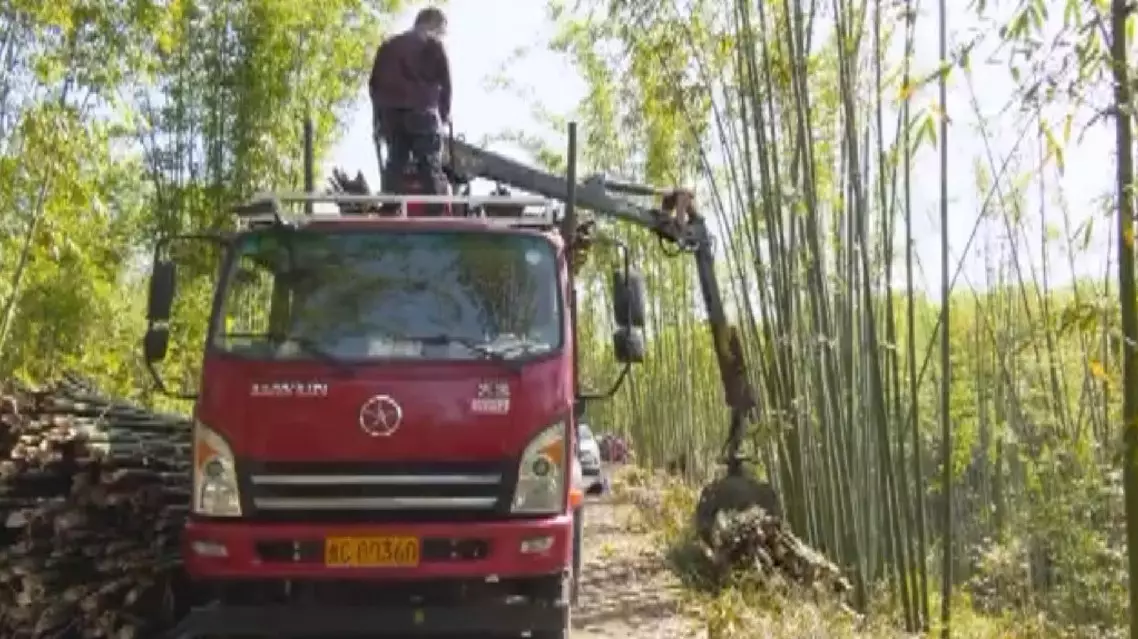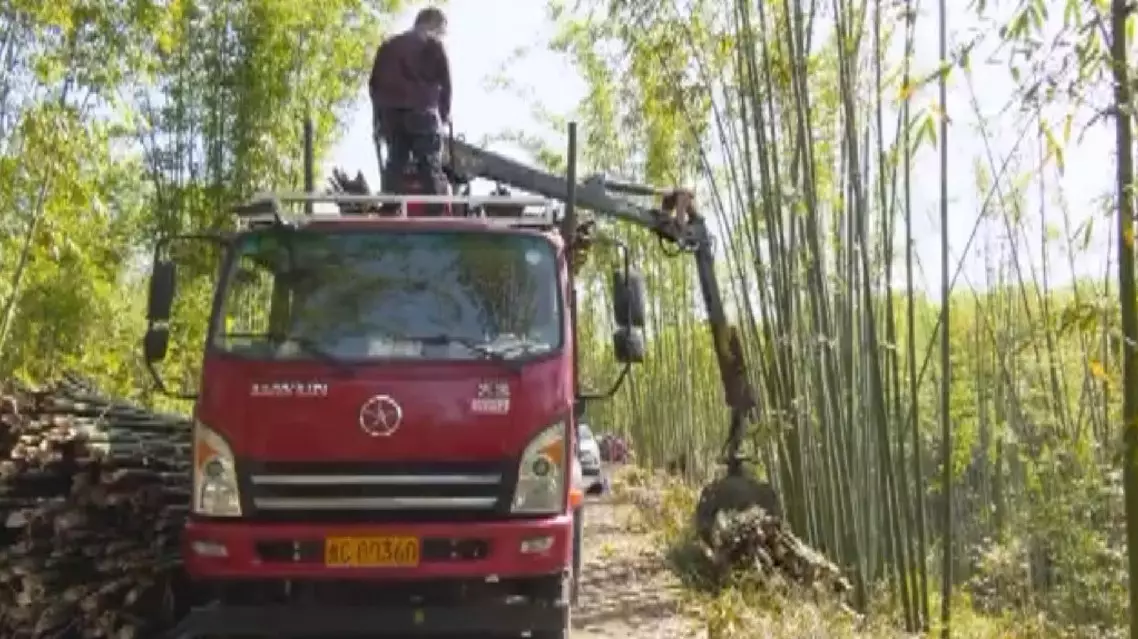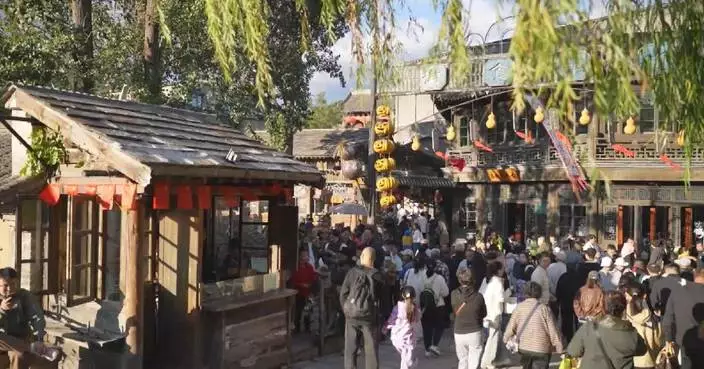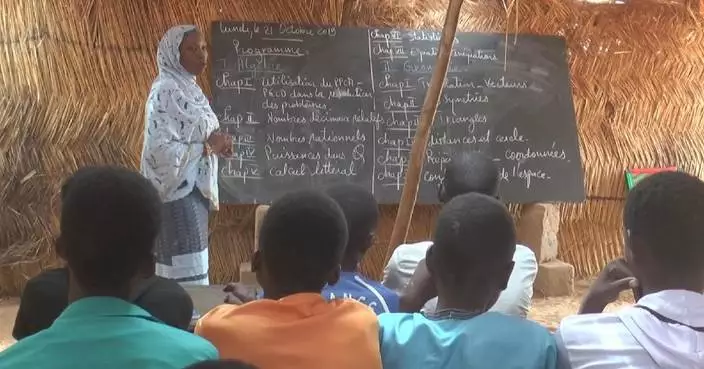Farmers in Chishui City of southwest China's mountainous Guizhou Province have found a new lucrative business to increase their income by venturing into the cultivation and sale of fresh bamboo, as they have been capitalizing on the local government's initiative to promote "afforestation through bamboo planting" and leveraging the favorable local conditions for bamboo growing.
Over recent years, the government of Chishui has always adhered to launching ecological protection projects in accordance with Chinese President Xi Jinping's environment conservation ideas and instructions.
Saying that "Lucid waters and lush mountains are invaluable assets," Xi has highlighted environmental protection on many occasions, stressing how humanity and nature form a community of life.
Approximately 82.51 percent of Chishui's land area, or about 2.24 million mu (around 150,000 hectares), is covered with forests. The city is also home to 86,600 hectares of bamboo forests. In recent years, Chishui has made significant efforts to develop its bamboo industry, creating a unique pathway to prosperity for its residents.
The city, with a population nearing 230,000, sees around 180,000 individuals involved in the bamboo industry.
Wang Deqin, a bamboo farmer in Chishui, manages a forested area spanning about 30 mu (2 hectares), which has significantly boosted her annual income by more than 40,000 yuan (approximately 5,503 U.S. dollars).
"Bamboo grows very fast, reaching over ten meters in height in just three to four months. We sell the harvested bamboo to pulp mills and building materials factories through cooperatives," Wang said.
Two years ago, she found a steady job at a local bamboo shoot processing plant.
"I earn a monthly salary of around five to six thousand yuan (about 688-825 U.S. dollars). Finding fulfilling work near my home has brought me happiness," she said.
Since 2018, nearly 300 bamboo processing enterprises -- including 16 large-scale ones -- have been established in the city, laying the groundwork for supplying a variety of bamboo products such as building materials, furniture, decorations, crafts, papermaking, and bamboo shoot processing.

Bamboo cultivation becomes lucrative business for farmers in southwest China's Guizhou

Bamboo cultivation becomes lucrative business for farmers in southwest China's Guizhou
A freelance writer from Australia has decided to become a permanent resident in China after living and working in Guangdong for 20 years, during which he has cycled through the country to see a real China and has witnessed the significant changes in the country.
Jerry Grey, 66, made his home in Zhongshan City of south China's Guangdong Province in 2004. The night he arrived in the city, he realized he had been misinformed about China.
"This used to be a supermarket. And my first day here, it was very late at night, 11, 12 o'clock at night. I got out of the car and walked through the supermarket and saw all the things that I carried with me from Australia. I had new shampoos and body washes and razor blades, all the things that I was told online you can't get these things in China, so you better buy them before you go. So I bought them all in Australia and carried them all to China. And I was misinformed. I didn't need to buy any of these things at all, because they're all cheaper here as well. I had to pay excess baggage in the airline because I was carrying so much weight. So that was a very strange experience. I also bought two bottles of Australian wine. And I can buy that in the supermarket, too," Grey said.
While serving as an English teacher at a foreign language school in Zhongshan, Grey spent a lot of his spare time traveling across China and fell in love with the welcoming people, beautiful landscapes, local cuisines, and a Chinese woman, who became his wife in 2009.
In 2014, Grey made a "crazy" decision to travel to Xinjiang by bicycle with a photographer friend, who is also a foreign expatriate.
"We left Zhongshan, traveled north into Hunan, and then Hubei, and then turned slightly northwest through Shaanxi, and then into Gansu, Ningxia, and across to Xinjiang. So that was quite an extended ride. That was 5,000 kilometers," Grey said.
It took them 57 days to finish that trip and finally see the magnificent views around Tianshan Mountains in Xinjiang.
"And the idea is that we want to see China. One of the most incredible things about riding a bike is the authenticity of the country, the real part of China," Grey said.
Grey has published a picture album titled "57 Days across China" to keep his memories alive and show people what he had seen during the journey. The funds raised from sales of the books have been used to help the people with disabilities in Zhongshan.
Over the past decade, Grey has ridden 35,000 kilometers in China, and his wife Liang Yuhua joined him in 2019.
In doing so, they have raised significant sums of money for people with disabilities and witnessed impressive changes in villages, where wide roads, modern home-stay hotels and restaurants have become common features in the past few years.
"In 2019, I noticed the significant changes when riding with Jerry. Especially, some rural areas are so clean that we didn't see any garbage. And the waste classification bins were placed neatly. So I told Jerry, 'see how great the changes that have happened in China over the years'," Liang said.
After retirement, Grey became a freelance writer. He has been posting videos on social media about what he has seen in China, including the Shenzhen-Zhongshan Link and the Village Basketball Association, an amateur rural basketball event that has become a nationwide sports phenomenon.
In recent years, Grey is impressed by the increasingly easier life in China, even for foreign travelers.
"So foreigners can actually open bank accounts in China. They can use WeChat and Alipay very, very simply as long as they're prepared before they arrive. Chinese payments are as convenient as it is possible to be," Grey said.
A few days ago, Grey went to the immigration office of Zhongshan and applied for a foreign permanent resident ID card.
"I think the time is right. I've lived here for 20 years, but for most of that time, I lived here on working permits and residence visas. Then when I retired from work, I'm on a spousal visa. And I think the time is right, because it gives me the card that I can travel around China without carrying my passport. And it becomes much more convenient. It's going quite smoothly. At the moment, we're waiting for the police checks to come back," he said.

Australian expat sees real China on bicycle











